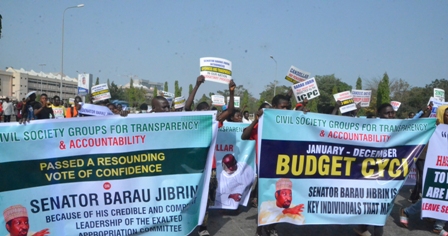Business
NLC Threatens Nationwide Protest Over Plan To Increase Fuel Price

The Nigerian Labour Congress (NLC) has threatened to shut down the nation’s economy by January 27, next year, if the Federal Government goes ahead with its plan to increase the pump price of Premium Motor Spirit (PMS) otherwise known as petrol.
It also warned the Federal Government to perish the idea of petrol subsidy removal, saying it will resist and reject any decision of the government that would inflict more hardships on the people.
Already, the organised labour has directed all its 36 branches and the Federal Capital Territory, FCT, Abuja to mobilize their members for a nationwide protest rally if the government should go ahead with the planned increase of petrol.
It threatened that it would not give the government any notice should it go ahead to remove the fuel subsidy before the January 27, 2022 protest rally date.
These were part of the decisions reached by the organised labour at the end of its National Executive Council (NEC) meeting in Abuja, last Friday.
In a communique signed by the President of the NLC, Comrade Ayuba Wabba, and the General Secretary, Comrade Emma Ugbaja, the organized labour stated that “an increase in the pump price of the Premium Motor Spirit (PMS) also known as ‘petrol’ by the government will expose Nigerian workers and the generality of the citizenry to acute deprivation, hardship and suffering as it would worsen the already established trend of hyperinflation in the country”.
It linked the genesis of the crisis in Nigeria’s downstream petroleum sub-sector especially as it relates to the petrol pump price regime to a policy of importation based pricing template for refined petroleum products as against local production based pricing template.
According to NLC, “as long as the pricing of refined petroleum products is based on importation pricing template which is heavily dependent on a volatile foreign exchange rate heavily skewed against the Naira, the price of petrol and other refined petroleum products will continue to rise beyond the reach of average Nigerian workers and citizens”.
The organised labour decried incessant increase in the pump price of petrol which, it said, was usually disguised as deregulation or removal of fuel subsidy, and therefore, condemned plans by the Federal Government to further increase the pump price of petrol.
The communique reads in part: “The NEC, therefore, resolved to reject and resist the planned increase in the pump price of petrol by the Federal Government as it described it as extremely insensitive to the acute hardship being experienced by Nigerian workers and people;
“That Government should promote the local capacity to refine petroleum products for domestic use;
“Pursuant to its rejection and resistance of further increase in the price of petrol, to organize protest rallies in all the 36 states of the federation on 27th January, 2022 which would culminate in the submission of protest letters to all the 36 State governors. Subsequently, a national protest will take place on 1st February, 2022 in Abuja; and
“In case the government decides to announce new petrol prices before the proposed protests, the protest will kick off instantly and without any other further notice in every state of the federation and the Federal Capital Territory”.
By: Boye Salau
Transport
Automated Points Concession : FAAN Workers Gave 72hrs To Revise Decisions In PH

Transport
FAAN Announces Pick-Up Points for Go-Cashless Cards

Business
Fidelity Bank To Empower Women With Sustainable Entrepreneurship Skills, HAP2.0
-
Politics4 days ago
2027: NIGERIANS FAULT INEC ON DIGITAL MEMBERSHIP REGISTER DIRECTIVE
-

 Environment4 days ago
Environment4 days agoLAWMA Director Says Sweeping Reforms Have Improved Waste Collection
-
Politics4 days ago
LP Crisis: Ex-NWC Member Dumps Dumps Abure Faction
-

 Politics4 days ago
Politics4 days agoUmahi Dismisses Allegations On Social Media, Insists On Projects Delivery
-

 Sports4 days ago
Sports4 days agoAbia Not Sure To Secure continental Ticket
-
Politics4 days ago
NATASHA ELECTRIC VEHICLES INITIATIVE IN KOGI CENTRAL
-
Sports4 days ago
La Liga: Yamal Records First Career Hat-trick
-
Politics4 days ago
IT’S A LIE, G-5 GOVS DIDN’T WIN ELECTION FOR TINUBU – SOWUNMI

